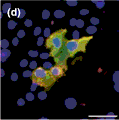Chemistry, Department of: Faculty Series

Ronald Cerny Publications
Document Type
Article
Date of this Version
2008
Citation
The Journal of Biological Chemistry VOL. 283, NO. 40, pp. 26985–26995, October 3, 2008
Abstract
MUC1, a transmembrane mucin, is a key modulator of several signaling pathways that affect oncogenesis, motility, and cell morphology. The interaction of MUC1 cytoplasmic tail (MUC1CT) with signal transducers and its nuclear translocation and subsequent biological responses are believed to be regulated by phosphorylation status, but the precise mechanisms by which this occurs remain poorly defined. We detected a novel association between the Met receptor tyrosine kinase and the MUC1CT. Met catalyzed phosphorylation of tyrosine at YHPM in the MUC1CT. Stimulation of S2-013.MUC1F pancreatic cancer cells with hepatocyte growth factor facilitated nuclear localization of MUC1CT, as determined by real time confocal imaging analysis. MUC1 overexpression also facilitated faster turnover of Met. Phosphorylation of MUC1CT by Met enhanced its interaction with p53, which led to suppression of AP1 transcription factor activity through interactions at the MMP1 promoter, ultimately leading to reduced transcription of MMP1. This correlated with a decrease in hepatocyte growth factor-induced invasiveness when MUC1 was overexpressed. The results demonstrate that MUC1 modulates Met-mediated oncogenic signaling in cancer.
Included in
Analytical Chemistry Commons, Medicinal-Pharmaceutical Chemistry Commons, Other Chemistry Commons


Comments
© 2008 by The American Society for Biochemistry and Molecular Biology, Inc.